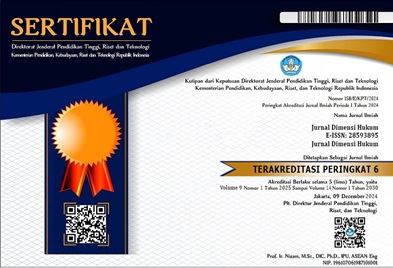MENELUSURI PERBANDINGAN PERBUATAN MELAWAN HUKUM DALAM SENGKETA MEREK DI NEGARA INDONESIA DAN THAILAND
Kata Kunci:
Perbuatan Melawan Hukum, Hukum Perdata, Merek, Thailand, IndonesiaAbstrak
Perbuatan Melawan Hukum (PMH) dalam hukum Indonesia awalnya dipahami secara sempit sebagai pelanggaran terhadap undang-undang, tetapi berkembang dengan mencakup pelanggaran norma kepatutan, kesusilaan, dan kepentingan yang dilindungi hukum, dipengaruhi oleh putusan Lindenbaum v. Cohen. Sebaliknya, konsep wrongful acts di Thailand sejak awal telah mencakup pelanggaran hukum, kesusilaan, dan kewajiban moral tanpa memerlukan interpretasi yurisprudensial yang luas. Dalam kasus sengketa merek, kedua negara mengedepankan prinsip first to file sesuai TRIPS Agreement. Meskipun regulasi belum secara eksplisit mengatur dilusi merek, unsur-unsur seperti blurring dan tarnishment ditemukan dalam peraturan masing-masing. Indonesia melalui UU No. 20 Tahun 2016 mengakui merek terkenal, tetapi memerlukan penyesuaian untuk skala global. Sementara itu, Thailand memiliki kriteria pendaftaran merek yang lebih rinci, meskipun implementasinya masih multitafsir. Harmonisasi konsep hukum tradisional dan perkembangan yurisprudensi diperlukan untuk memastikan kepastian hukum yang berkeadilan.
Unlawful Acts (PMH) in Indonesian law were initially narrowly defined as violations of statutory provisions. However, under the influence of the Lindenbaum v. Cohen case, the concept has expanded to include breaches of norms of decency, morality, and legally protected interests. In comparison, the concept of wrongful acts in Thailand has, from the outset, encompassed violations of law, decency, and moral obligations without relying heavily on jurisprudential interpretation. In trademark disputes cases, both countries apply the "first to file" principle in line with the TRIPS Agreement. While neither country explicitly regulates brand dilution, elements such as blurring and tarnishment can be identified within their respective legal frameworks. Indonesia, through Law No. 20 of 2016 on Trademarks and Geographical Indications, recognizes well-known brands but requires further adjustments to address global-scale challenges. Meanwhile, Thailand has more detailed criteria for trademark registration, though its implementation remains open to interpretation. Harmonizing traditional legal concepts with evolving jurisprudence is essential to ensure equitable legal certainty.





